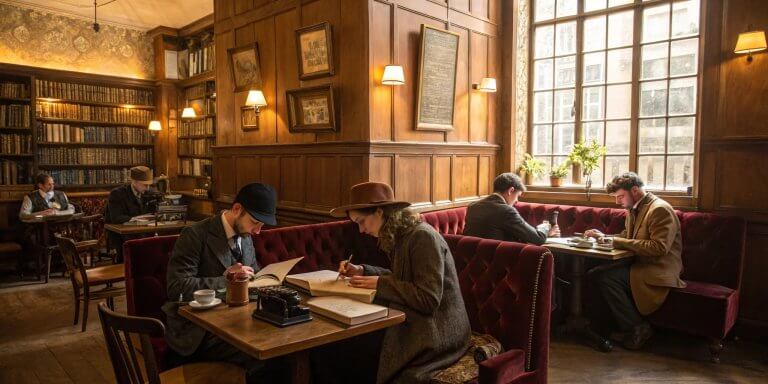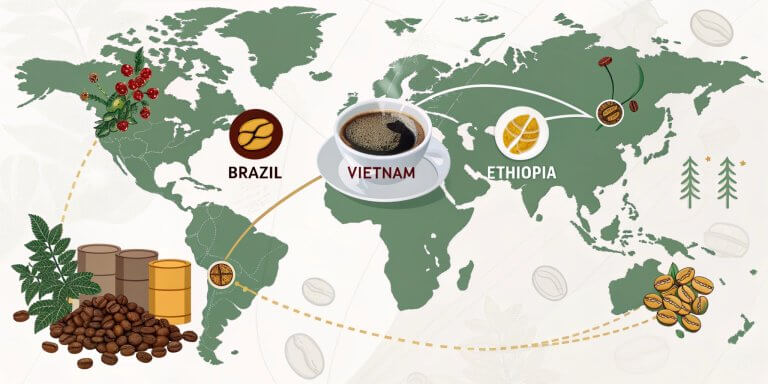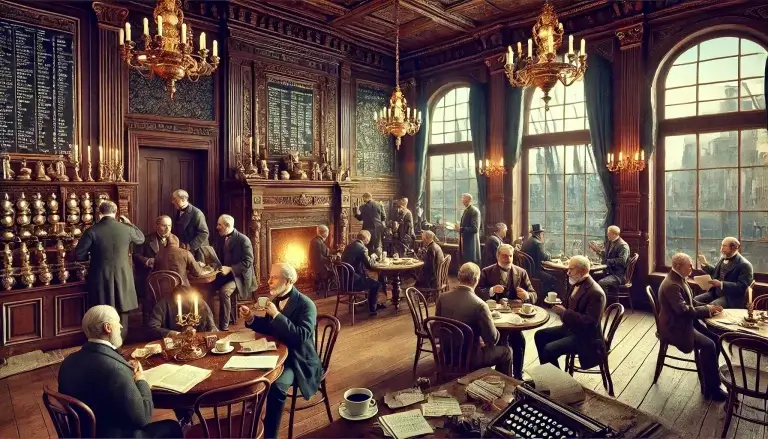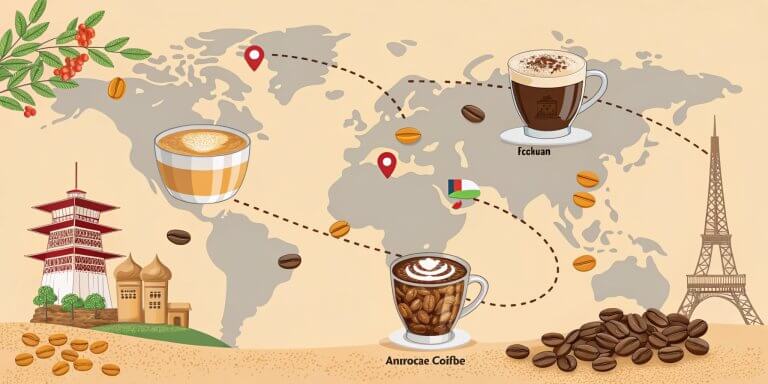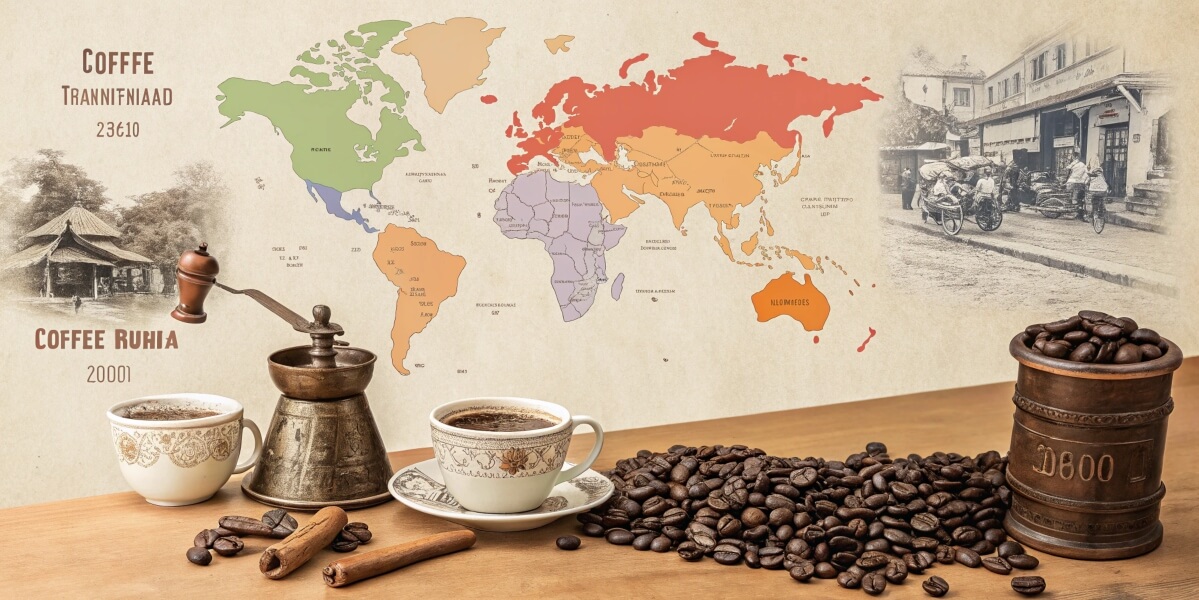
Coffee is more than just a drink; it’s a global phenomenon that has shaped cultures, fueled revolutions, and connected people for centuries. From its legendary beginnings in the Ethiopian highlands to its role in 17th-century European coffeehouses, coffee’s history is as rich as its flavor. By looking into coffee’s history, traditions, and global journey, we begin to see how this simple beverage became a cultural staple worldwide. Markman Ellis’ The Coffee House: A Cultural History offers a deep dive into Origins of Coffee,how coffeehouses became key players in social and intellectual life, and this article will walk you through coffee’s journey from humble beginnings to a beloved global commodity.
Legendary Beginnings in Ethiopia
According to legend, coffee was discovered in Ethiopia by a goat herder named Kaldi. Kaldi noticed that his goats became unusually lively after eating red berries from a particular bush. Curious, Kaldi took the berries to monks nearby, who began brewing them into a drink that helped keep them awake during long prayer sessions. This discovery, while told as a legend, points to the ancient origins of coffee as a tool for alertness and social interaction.
Ethiopia’s relationship with coffee continued with Kaldi. Even today, coffee plays a vital role in Ethiopian culture, most notably through the coffee ceremony. In this ritual, coffee beans are roasted, ground, and brewed in front of guests in a process that can take several hours. The coffee ceremony symbolizes hospitality and respect, reflecting how deeply woven coffee is into Ethiopian society.
Statistically, Ethiopia remains a significant coffee producer, contributing nearly 3% of global coffee production.
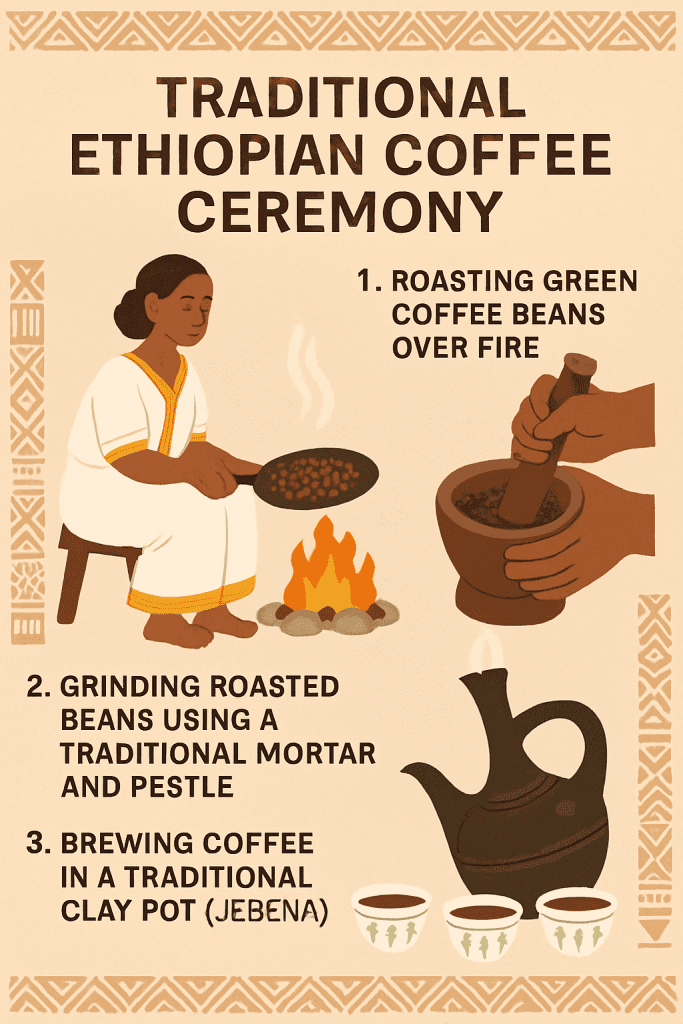
The three stages of the traditional Ethiopian coffee ceremony
This close connection between Ethiopia and coffee shows how the beverage is a source of national pride and a critical economic driver.
Coffee’s Role in the Islamic World
Coffee went from Ethiopia to the Arabian Peninsula, becoming popular in Islamic societies by the 15th century. Coffeehouses (Qahveh Khaneh) emerged as popular social hubs in cities like Mecca and Cairo. People would gather in these coffeehouses to discuss politics, philosophy, religion, and art. These establishments became so influential that they were sometimes called “schools of the wise,” as they were spaces where knowledge and ideas were freely shared.
However, coffee’s rise in popularity was not without resistance. Some Islamic leaders were initially skeptical of coffee, fearing it had intoxicating effects. Despite this, coffee persisted and became a central part of life in the Islamic world. Today, coffee remains vital in Middle Eastern cultures, where serving coffee is often seen as a sign of hospitality. Coffee’s journey through the Middle East also paved the way for its eventual introduction to Europe.
Europe’s Fascination with Coffee
When coffee first arrived in Europe in the 16th century, it was met with curiosity and skepticism. Europeans were initially suspicious of the drink due to its ties with Islamic culture. However, as merchants brought more coffee from the Middle East, its unique taste and stimulating effects began to win people over. Venetian traders were among the first to introduce coffee to European markets, and soon, coffeehouses began to appear across the continent.
In cities like London and Paris, coffeehouses quickly became social and intellectual life centers. These establishments were often called “penny universities,” as a cup of coffee could be purchased for just a penny, allowing anyone to join discussions about politics, science, and philosophy.
The first coffeehouse in England opened in Oxford in 1650, and by the 18th century, there were hundreds of coffeehouses across Europe.
Coffee had taken root in European culture, and it wasn’t just for the elite — it became a drink for people from all walks of life.
The Impact of Coffee on the Enlightenment
European coffeehouses became more than just places to enjoy coffee; they were hubs of intellectual exchange. Many historians believe coffeehouses played a crucial role in the Enlightenment, a period in the 17th and 18th centuries when reason, science, and individualism were emphasized. Writers, philosophers, and scientists would meet in coffeehouses to debate ideas, share discoveries, and plan revolutions.
For example, in England, coffeehouses became the meeting places for figures like Isaac Newton and John Locke, who shaped modern science and political philosophy. Coffeehouse discussions also influenced the American and French Revolutions. The French Revolution, in particular, saw coffeehouses in Paris become gathering places for revolutionaries.
Coffee was more than just a drink during the Enlightenment — it was the fuel that powered some of the most significant ideas in history.
Colonial Expansion and Global Production
As coffee became more popular in Europe, demand for the beverage skyrocketed. European colonial powers sought to grow coffee in their overseas territories, where climates were ideal for coffee cultivation. By the 18th century, coffee plants had been introduced to the Caribbean and Central and South America, with Brazil eventually becoming the world’s leading coffee producer. Brazil’s coffee production dominance continues today, accounting for roughly 37% of the world’s coffee supply.
However, this period also saw the darker side of coffee production. European colonists relied on enslaved labor to cultivate coffee on plantations, particularly in the Caribbean and Latin America. The legacy of exploitation still impacts many coffee-producing countries today, where small-scale farmers struggle to make a living due to global market forces.
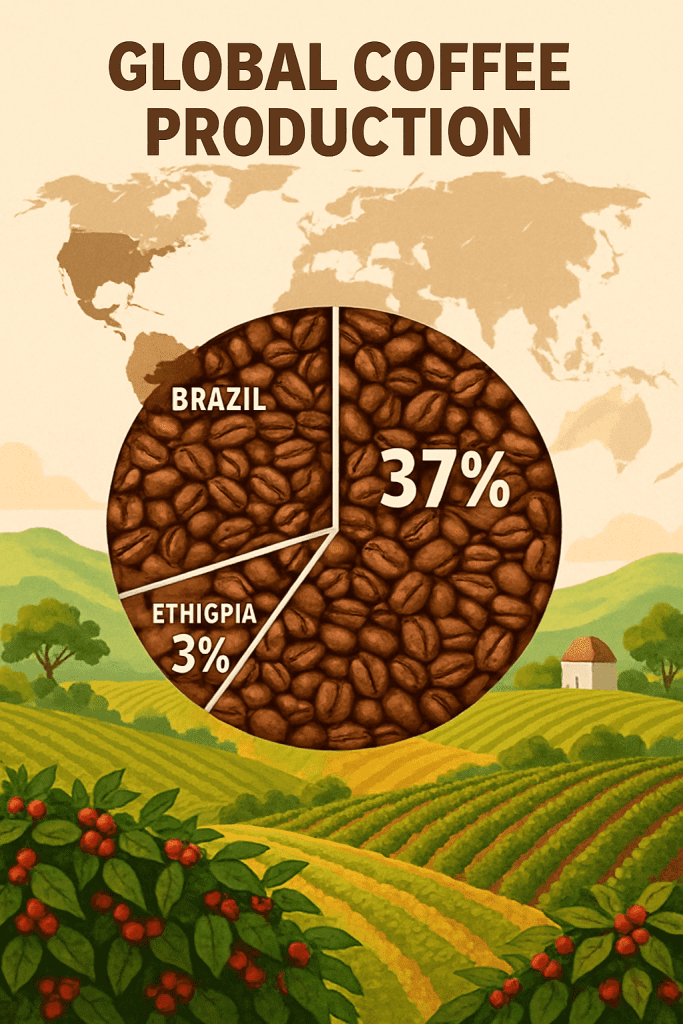
Global coffee production by major producing countries
The Industrialization of Coffee
The 19th century marked a significant change in coffee production and consumption. With the rise of industrialization, coffee could be processed and packaged on a much larger scale, making it more affordable and accessible to the masses. The invention of instant coffee in the early 20th century revolutionized how people drank coffee, offering a quick and convenient way to enjoy the beverage.
The rise of chain coffee shops in the 20th century further changed coffee culture. Companies like Starbucks standardized coffee consumption, offering a consistent experience across different locations. While some argue that this has led to the commodification of coffee, others see it as a way of making coffee more accessible worldwide.
Modern Coffee Culture and the Rise of Specialty Coffee
In recent years, the rise of the specialty coffee movement has brought a renewed focus on the quality and origin of coffee. Known as “third-wave” coffee, this movement emphasizes artisanal brewing methods and a closer relationship between coffee producers and consumers. Specialty coffee shops often prioritize sourcing beans directly from farmers, focusing on sustainability and fair trade.
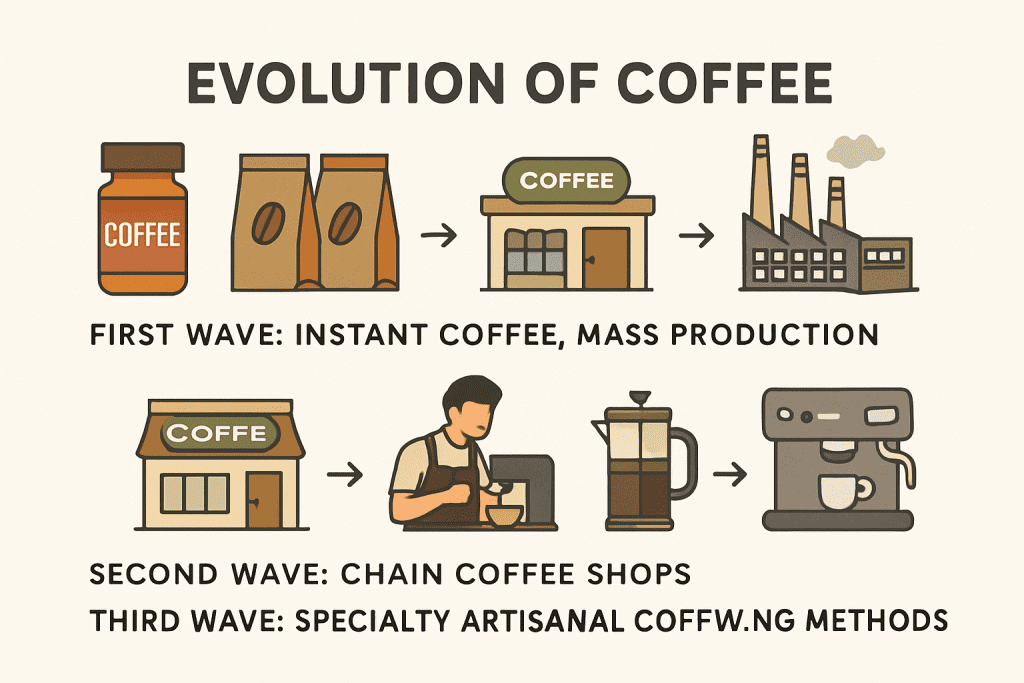
The evolution of coffee culture through three distinct waves
This new wave of coffee culture has led to the growth of independent roasters and cafes, where customers can enjoy a meticulously brewed cup of coffee. These coffee shops are often places for community engagement, creativity, and relaxation. The specialty coffee movement has not only elevated the craft of coffee-making but also raised awareness about coffee production’s environmental and social impacts.
Coffee’s Cultural Significance Today
In many parts of the world, coffee is more than just a drink — it symbolizes its hospitality, tradition, and community. In Ethiopia, the coffee ceremony is a time-honored tradition that brings families and friends together. In Italy, a quick espresso at a local cafe is a daily ritual that offers a brief moment of reflection and connection. Meanwhile, in Sweden, the tradition of fika encourages people to take a break, enjoy a cup of coffee, and socialize
Across the globe, coffee continues to be a vehicle for bringing people together. Whether through traditional rituals or modern coffee shop culture, coffee symbolizes connection, creativity, and shared experiences.
Conclusion
The story of coffee is one of transformation, from its discovery in Ethiopia to its role as a global commodity. Coffee has shaped economies and played a crucial role in shaping intellectual thought, culture, and society. Today, coffee continues to be a beloved beverage that brings people together, fuels creativity, and fosters connections across cultures and generations.
Whether enjoying a simple cup of black coffee at home or sipping on an artisanal brew at a specialty cafe, you’re participating in a centuries-old tradition that has stood the test of time. Coffee’s journey, from its legendary origins to its modern-day significance, is a testament to its enduring appeal and cultural importance.

